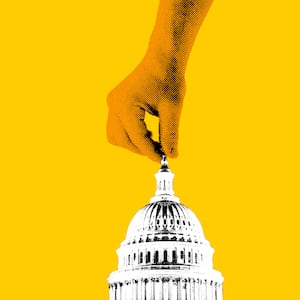In the three years since armed insurrectionists stormed the U.S. Capitol, Donald Trump and his allies have rewritten history to portray the rioters as patriots seeking to prevent an illegitimate government from taking power.
The Jan. 6 attack was supported by 147 Republican members of Congress, 70 of them from Southern states, a geographical sorting with echoes of the Civil War.
There’s no mistaking which part of the country has the most vested in the ongoing resistance to President Joe Biden’s legitimacy. “Southern Republicans are the sun around which the other planets revolve,” says Bill Galston, a senior fellow in governance studies at the Brookings Institution. He explains how the old segregationist Democrats of the South switched parties beginning in the late 1960s after Lyndon Johnson signed civil rights legislation.
“There were certain sentiments no longer respectable to voice publicly, but they did not change their views,” says Galston. “In the modern South, the fewer minority voters you have, the harder-edged conservative you can be.” Gerrymandering finished the job, locking in much of the South behind Trump’s Big Lie that he was somehow cheated out of the presidency.

U.S. Rep. Elise Stefanik (R-NY) speaks at the U.S. Capitol Building on Oct. 17, 2023 in Washington, DC.
Win McNamee/Getty ImagesA stunning graphic prepared by The Washington Post finds that 117 of the 147 proponents of the Big Lie are running for re-election, and though the vast majority of those running are from the south, there are Big Lie proponents running from every region of the country—including the northeast, where Rep. Elise Stefanik (R-NY) has adopted Trump’s term of “hostages” for the Jan. 6 insurrectionists awaiting trials and sentencing; the midwest with Sen. Josh Hawley (R-MO) and Rep. Jim Jordan (R-OH); and the West with the fringiest of the fringe Reps. Lauren Boebert (R-CO) and Paul A. Gosar (R-AZ)—“a collection of American politicians engaged in using democracy to attain the power to subvert it,” The Post concludes.
Before there was Jan. 6, there was the 2017 Unite the Right white supremacist rally in Charlottesville where counter-protester Heather Heyer died, and President Trump proclaimed there are “very fine people on both sides.” The torch-wielding marchers were the wake-up call that motivated then-private citizen Joe Biden to run for president.
Now Biden is once again confronting Trump and those he says are trying to “steal history” by reframing Jan. 6 as an act of heroism.

President Joe Biden speaks while Rep. James Clyburn (D-S.C.) listens, at the historic Mother Emanuel AME Church on Jan. 8, 2024 in Charleston, S.C.
Ricky Carioti/The Washington Post via Getty ImagesSpeaking in the South Carolina church where a white supremacist gunman killed nine people, Biden likened the Confederates who embraced the “lost cause”—that the war was about state’s rights, and resisting federal power, as Nikki Haley recently suggested, and not about slavery. “Now, we’re living in an era of a second lost cause,” Biden said, citing the 2020 election and those “trying to turn loss into a lie.”
Whether this will prove to be a political winner for Biden is uncertain, but it was high time that he publicly confronted the threat Trump and the Big Lie pose to his re-election, and to America’s democracy. “If you’re unpopular and you’re back on your heels in the polls and your troops are disorganized and complaining there’s no message, you have no alternative but to speak boldly and clearly to give them something around which they can rally and repeat,” says Galston.
Matthew Dallek is a historian at George Washington University who specializes in political extremism. “The violent overthrow of Reconstruction and the violence we saw on Jan. 6 have one thing in common,” he told The Daily Beast. “They were both instigated by a lie that the federal government had committed monstrous acts that trampled on people’s liberties.”
Historian Karen Cox is the author of No Common Ground: Confederate Monuments and the Ongoing Fight for Racial Justice.” Her opinion piece comparing the Jan. 6 insurrection to the South’s “Lost Cause” appeared in The New York Times two days later, on Jan. 8, 2021, with the headline, “It is hard to miss the parallels between now and then in rewriting history and campaigns of disinformation.”

A supporter of US President Donald Trump carries a Confederate flag as he protests in the US Capitol rotunda on Jan. 6, 2021, in Washington, DC.
Saul Loeb/AFP via Getty ImagesIn a phone call with The Daily Beast. Cox calls the Southern whitewashing of the Civil War “the biggest lie told in the U.S. because we lived it for over a century.” What’s different about today’s “lost cause” is that it is not limited to the South and resonates outside of the South.
When then-South Carolina Gov. Nikki Haley signed a bill in 2015 to remove the Confederate flag from the state capitol grounds, Republican-dominated legislatures enacted heritage protection laws to protect statues honoring Confederates. “There continues to be political preservation of Lost Cause mythology because it serves them politically,” says Cox. “It’s part of their cultural war. Wipe out their monuments and you’re wiping out white men in a way they take very personally. Trump is tapping into that, and Biden’s comments are pushing back on that.”
Political analyst Larry Sabato is a native Virginian and during the 100th anniversary of the Civil War (commemorated almost daily from 1961 to 1965), he told The Daily Beast, “I was convinced as a kid that the South won. Every day some general was celebrated. It’s laughable now, but you still have heavy concentration of pro-Confederacy sentiment in rural areas. I completely reject the Old South, but many of my peers came to the opposite conclusion. There are a lot of family ties with people who fought. In some rural parts of Virginia, you’d think it was the late 1860s. It’s still sometimes called the ‘War of Northern Aggression’ even though South Carolina started it. The [historical] echoes are real. They’re both rebellions aimed at overthrowing the legitimate government, and that’s foundational.”
Ulysses S. Grant—who led the Union troops to victory, then served as president—as he lay dying of throat cancer, wrote about Confederate General Robert E. Lee in the last chapter of his memoir: “I felt like anything rather than rejoicing at the downfall of a foe who had fought so long and valiantly, and had suffered so much for a cause, though that cause was, I believe, one of the worst for which a people ever fought, and one for which there was the least excuse.”
It’s unlikely that any of the leaders of today’s Lost Cause will receive such a generous epitaph.








